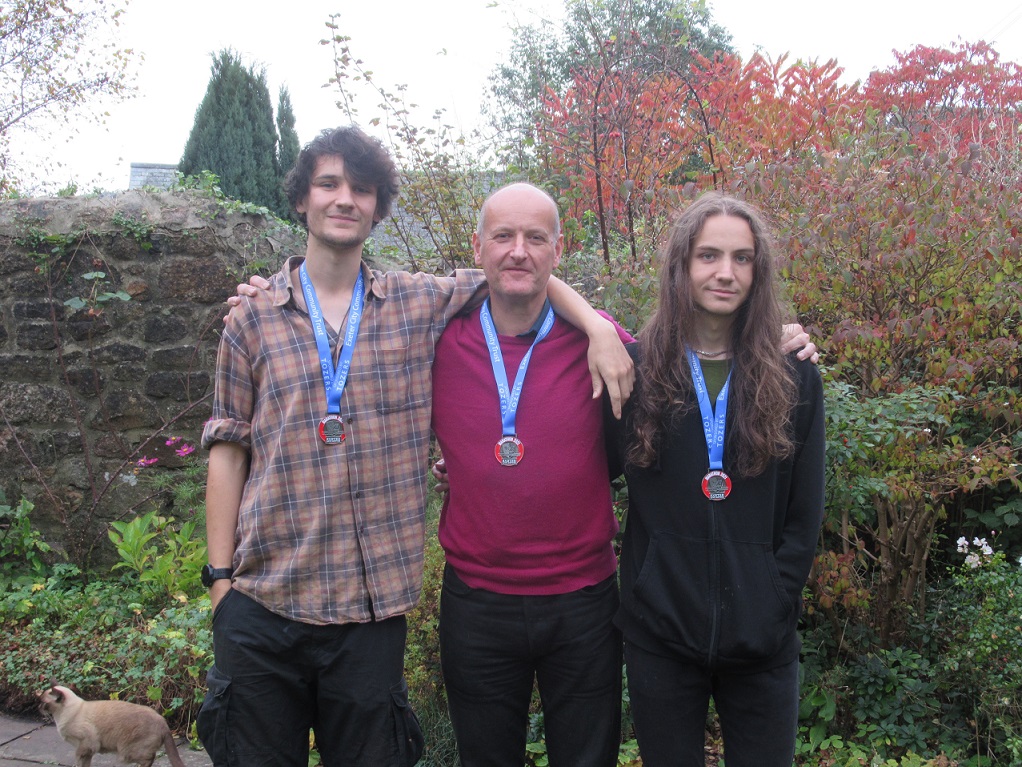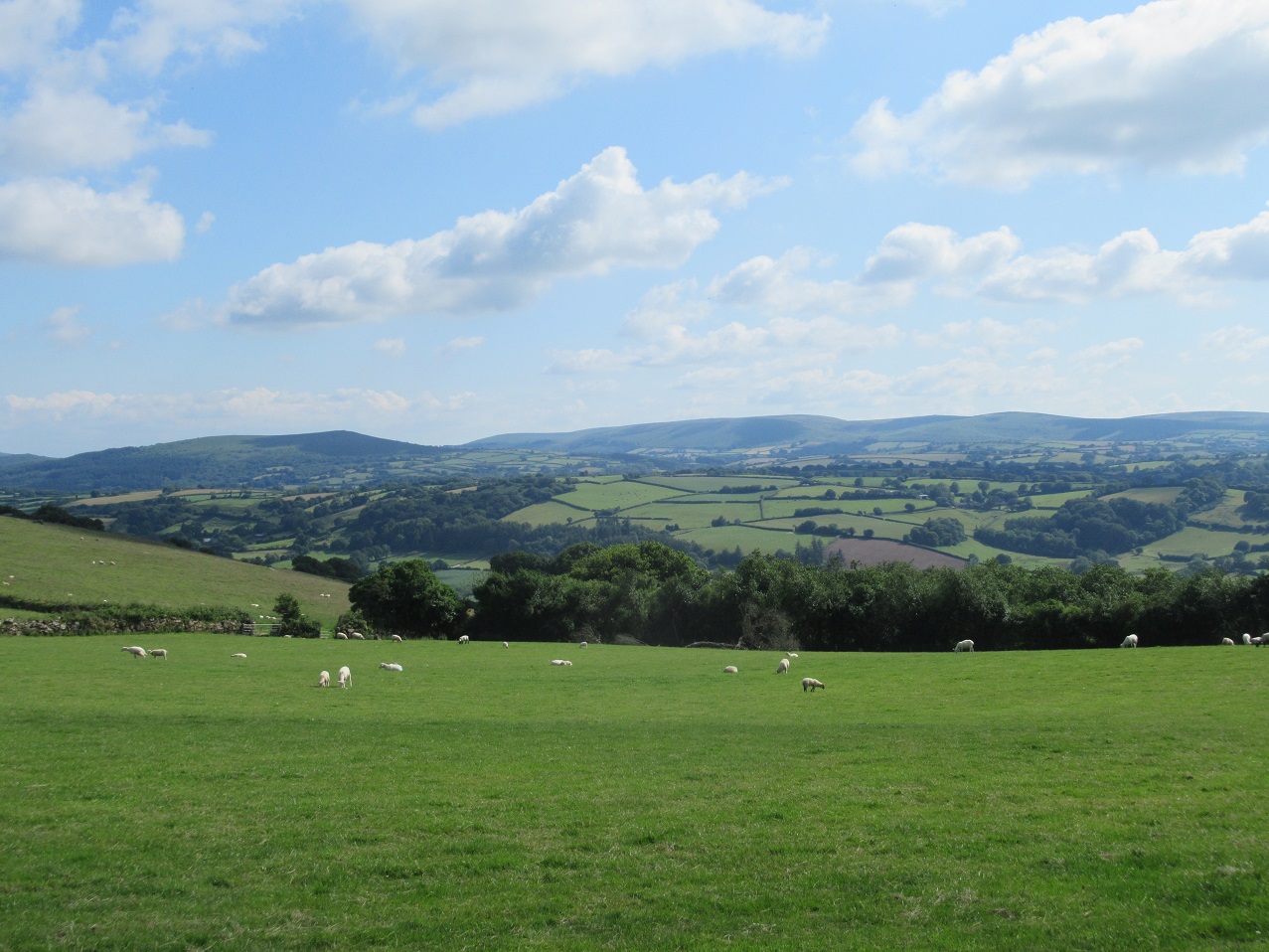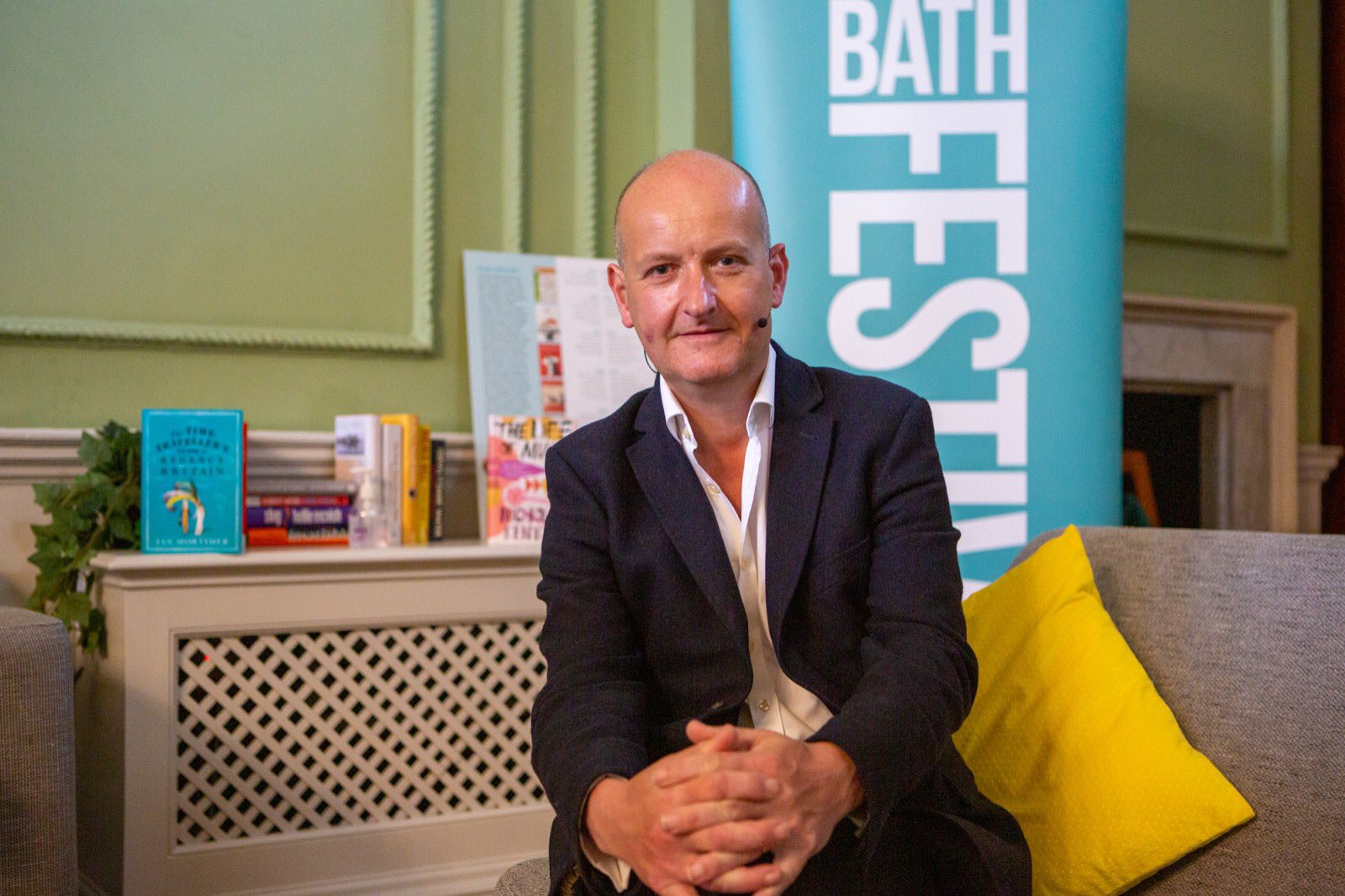home > what's new? |
Ian Mortimer |
What was New in 2021?
12 November 2021 My sons, Alexander and Oliver, agreed to run the Exeter Marathon with me on 7 November. We decided to do it for a local charity, Green Hill Arts, which is need of money at the moment. Truth be told, none of us had done enough training. I told the boys (neither of whom had previously run a marathon), don't treat it like a half marathon, it's a totally different sort of beast. Just run very, very slowly and don't stop. That is precisely what they did. Both finished without having to walk. They made me very proud. Moreover, at the end of the reckoning, we had made over £5,000 for Green Hill Arts. That too made me proud. And I did my best time yet for a marathon (not my strongest distance...) which was 3:38:48. You can still donate - until 10 December - by going to this JustGiving page. Any help you can give will be gratefully received.
The Exeter Marathon

6 November 2021 My friend Karen asked me this question. As she is not the first, I'm sharing my answer on my essays page. 1 November 2021 This year I stood for election to the Council of the Royal Historical Society. This was largely because it seems to me that the Society could benefit from hearing the perspective of a non-academic historian and scholar - one who understands the academic system but is not beholden to it. After all, the Society does state that it is 'working for history and historians', not just academic history and academic historians, so the fact that its Council is entirely composed of academics is a bit limiting if the organisation wants to see the bigger picture. My candidature caused several Fellows of the Society to write to me in support, emphasising just this point about the need for non-academic history and historians to be represented. In the end, I came fourth (out of eleven candidates). But in the course of the campaign, I gave a lot of thought to what difference I could make. What would I say that no academic would? What would be my priorities? Gradually this formed into a view of what I think is going wrong with the profession - and has been going wrong for the last forty or fifty years - and what the Society could do to put things right again. I therefore wrote an open letter to Professor Emma Griffin, the president, on 30 September. I made this available publicly on this website recently, at this page. The Academic Director of the Society, Dr Philip Carter, has today given permission for me to make available his reply, which is available here. I hope that this starts to focus people's minds on how we can start to move publicly funded history out of its 1970s and 1980s format and look at respoitioning the skills of analysing historical information and evidence in ways that are relevant and useful in the modern world. At the same time, it is just as essential that we interpret the past with a broader view than the academic discipline allows - for its drama, its emotions, its fun and (above all else) its meaning and significance for us. This is partly for the sake of encouraging public interest in our past. But it is also about what we share as a species on this planet. Seeing the direction in which society is heading in the future depends heavily on knowing where we have come from in the past. That, I think, is something on which we can all agree.
16 October 2021 It’s only five days until the paperback of The Time Traveller’s Guide to Regency Britain is published. The offer on the first in the series, The Time Traveller’s Guide to Medieval England, has now come to an end but this month, the Regency volume is just 99p on Kindle.
15 October 2021 In order to support independent bookshops, I have opened a page on uk.bookshop.org. See uk.bookshop.org/shop/ianmortimer for details.
15 September 2021 It’s just over a month until the paperback of The Time Traveller’s Guide to Regency Britain is published. In the meantime, the first in the series, The Time Traveller’s Guide to Medieval England is just 99p on Kindle for September. See amazon.co.uk
15 July 2021 Those wondering what I am up to might like to know that I am working on two projects. One is bring to completion a book of speeches and essays entitled Medieval Horizons. This seeks to reassess how we think of the Middle Ages. In the book I argue that the basis, patterns and values of modern lives were developed in the Middle Ages and have changed little since, and that the idea that change is all modern is purely down to our obsession with technology, which stops us seeing the development of the human mind and character. The other project is A History of England through the Windows of an Ordinary House. Most histories of England are bits and pieces - a bit for the north for the Industrial Revolution, the Welsh Marches and Scotland during the reign of Edward I, London in the age of Samuel Pepys, and so forth. It's something of a hotchpotch. So I had the idea of writing a history of England as it would have appeared from one spot, i.e. this house in Devon, over the last 1300 years. It is at once a national history, a local history and a social history - and an exceedingly exciting thing to be engaged in doing. Rarely have my long walks around the area been so productive, and I am particularly enjoying them when the weather is good.
2 June 2021 Every so often in an interview I get asked a question that really makes me think. That happened with Greg Hickey's short interview for his Kinesophy blog. Very glad I said yes to that one.
21 May 2021 I thoroughly enjoyed speaking to a real audience for the first time in eighteen months today - at Bath Literature Festival. I was talking about Regency Britain.
15 May 2021 At the start of the year, a reader of BBC History Magazine sent in the question, 'when was wealth most equally shared in Britain?' I answered as best I could. But it was one of those questions that gets under your skin. I thought about it some more. I ended up writing an overview of the subject as an essay for Engelsberg Ideas, which has now been published here. I subsequently have gone on to write a longer examination of changes in equality in the medieval period, which I hope will appear in a book of essays in due course.
29 March 2021 A little while ago I did an interview with Taylor Kniphfer and Lonny Gomes for their PennyDog podcast about Regency authors and various aspects of The Time Traveller's Guide to Regency Britain. It was great fun. I've been in touch with Taylor by email for many years, so it was a wonderful experience finally to have a conversation via zoom. The podcast is available at PennyDog podcast.
26 March 2021 Piper Verlag will publish a German edition of The Time Traveller's Guide to Regency Britain in Autumn 2022, following their publication of the paperback of the Elizabethan one, under the title Shakespeares Welt, in the spring. Capitán Swing Libros will publish a Spanish edition of The Time Traveller's Guide to Medieval England. China Times will publish a new Taiwanese edition of Centuries of Change. Hyeonamsa will publish a Korean edition of Centuries of Change. This very welcome news means that my books will be available in fifteen foreign languages. One or more of my history books appears - or is set to appear - in German, Italian, Spanish, Portuguese, Estonian, Russian, Polish, Simplified Chinese, Complex Chinese, Japanese and Korean; in addition, my James Forrester novels were translated into Danish, Latvian, Hungarian and Czech.
23 March 2021 An article I wrote about today's sale of books from Spetchley Park library, and what they reveal as a group about changing attitudes since the late eighteenth and early nineteenth centuries, is now available on the Telegraph website.
22 March 2021 I apologise if anyone has been looking at this page for news of what I've been up to. Almost a quarter of the new year has already passed. Perhaps a fuller update now will do something to make up for it. Very sadly, my aunt, Jenefer, was taken from the family by Covid-19 in January. As I said in my eulogy at her funeral, she was a lady who dedicated her entire life to the family, and my brothers and I were very close to her when growing up. In later years, one of my cousins held an annual party for the whole extended family and Jenefer always enjoyed it mightily, and was keen to hear everyone's news. She was also the last link with the world of the family before the last war, when they lived in Plymouth; she was always very keen to tell me all about those days, and what my late father, John Stephen Mortimer, was like as a boy, and what my grandparents were like before they grew old. She is going to be very much missed. The publication of The Time Traveller's Guide to Regency Britain has led to a few online talks, which I have very much enjoyed. For those in the USA, terms have been agreed with the publishers of the hardcopy and ebook (Pegasus) and the audiobook (Tantor). I believe the latter is scheduled for 2022; not sure about the former. I have also signed a contract with Piper Verlag for the German edition, wich is scheduled for hardback publication in the autumn of 2022. Due to Covid-19 restrictions, I cannot work on the book I am meant to be writing at the moment, The Warrior of the Roses: the life of Richard, duke of York, which is under contract with The Bodley Head. In the meantime, I carried out some local research and wrote two articles for the Transactions of the Devonshire Association. One is entitled 'The Location and Extent of King Alfred’s Suðewyrðe'. This shows - in three separate ways - why we can be confident that the Domesday estate Sutreworthe was synonymous with Lustleigh, putting the question beyond doubt. The article also shows that Sutreworthe was previously a royal manor, and so were parts of the manor of Bovey Tracey. In this way the Anglo-Saxon estate of Suðewyrðe is reconstructed, in part at least. This was left by Alfred the Great to his younger son, Aethelweard, and returned to the royal family after the death of both of Aethelweard's sons at the Battle of Brunanburgh in 937. The granting out of the land piecemeal between 937 and 1016 allows us to reconstitute the farms of the Wray Valley in the tenth century. The other article for the Transactions of the Devonshire Association is entitled 'The development of three twelfth-century hill farms in Moretonhampstead'. This work was triggered by my accidentally coming across a published calendar of an entry in a medieval cartulary relating to Bowdon, Cranbrook and Willingston farms in the north of Moretonhampstead parish and realising the last-mentioned one had been misidentified by the authors of The Place Names of Devon. I mentioned this to a friend of mine who replied, 'You do realise that calendared version misses out a line, don't you?' I didn't. Anyway, he kindly sent me a copy photograph of the original 13th-century document in the British Library and, having seen the missing line, I immediately realised the potential to reconstruct not just early names but the development of the whole area, from pre-1170 to post-1200. As the land is high-altitude, this was very exciting because it allowed me to gauge how densely settled the locality was at that early date, as well as changes in the way the manor was run. A third piece of research, into the freehold sales in the manor in the later Middle Ages, was put on pause, so as not to overwhelm the editor. The two pieces mentioned above should appear in the forthcoming edition of Transactions. My next project is an experiment. It is a history of England with a twist. I am writing it from the point of view of those who have lived in this house. And before this house was built (15th century) those who lived in the previous houses on the site, since the foundation of Moreton in the 8th century. It is provisionally called The History of England through the Windows of an Ordinary House - because you look IN through windows as well as look out of them. The ambition is to write a book that is a political narrative (in part) as well as a social history and a local history. It might prove unpublishable in the end - but so what? Not enough people experiment with literary form in non-fiction, in my opinion, so this is my tuppeny-worth contributiion to a new form of historical literature. For anyone who is wondering whether I am still running, the answer is yes. My regime these days is to balance running and walking, 50:50, to avoid another stress fracture (I've now had five), and to cover 400Km (250 miles) in this way, on average, every month. The rule I set myself to avoid physical damage is this: if I run 7K or more one day, I have to take the next day off running; if I run more than 15K, I have to take the following 2 days off. I can't say I have been writing much about runnning in lockdown but I have been thinking of doing so, and probably will return to writing about the meaning of running in due course. Finally, may I wish all my readers a very, very belated - but no less sincere - Happy New Year. Perhaps we will get to enjoy more of this one than we did of the last.
How do you accidentally run a marathon?
Correspondence with the Royal Historical Society
Kindle offer
UK Bookshops
Kindle offer

Update

Interview about the meaning of running
A real event, for once!

A historical view of Equality
New audio interview about Regency Britain
German, Chinese, Spanish and Korean editions
Article on the Spetchley Park books sale
Update - after too long a time, I know
What was new in other years
2020
2019
2018
2017
2016
2015
2014
2013
2012
2011
2010
2009
2008